Groundbreaking Celebrated for West Hartford Fellowship Housing Expansion and Redevelopment
A project many years in the planning to renovate and expand an affordable housing community has officially gotten underway in Bishops Corner, where a groundbreaking was held Tuesday morning at West Hartford Fellowship Housing.
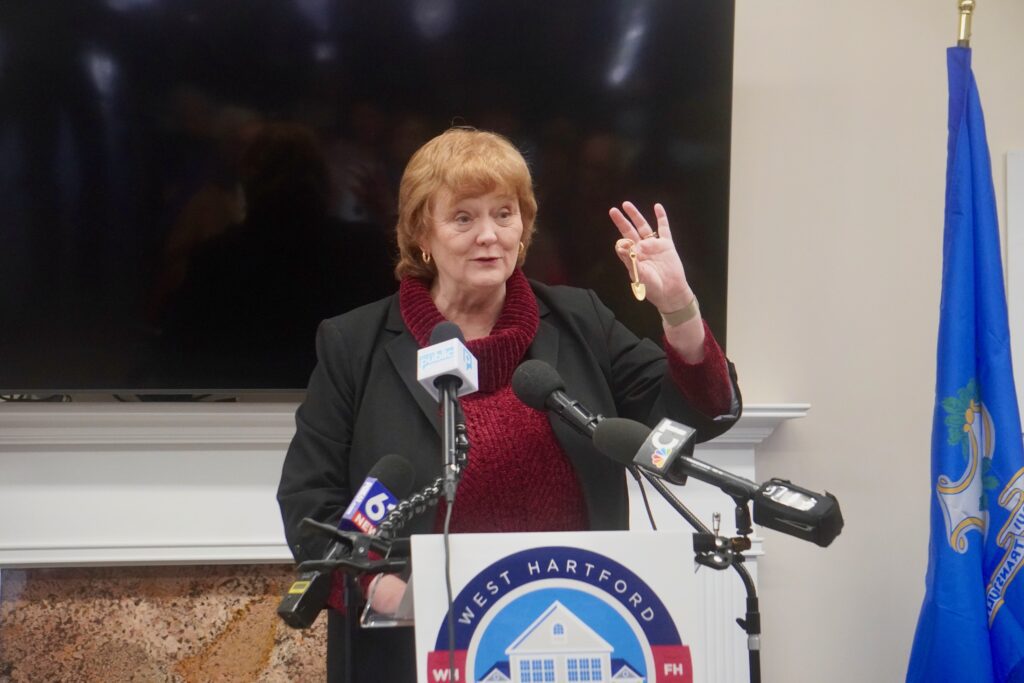
West Hartford Fellowship Housing Board President Clare Kindall holds up one of the keychains that were given as commemorative gifts to those attending the groundbreaking. Photo credit: Ronni Newton
By Ronni Newton
Clare Kindall, the president of West Hartford Fellowship Housing Development Board, emceed the groundbreaking celebration for the launch of the redevelopment and expansion of the 50-year-old affordable housing community in Bishops Corner on Tuesday morning, and when everyone had finished speaking, just before the ceremonial shoveling of the dirt, she asked those present to be sure to take home one of the small boxes that had been left on the chairs.
“In 18 months our residents are going to have these keychains and they are going to open up their new apartments in this new building,” Kindall said. “These are a memory, and a promise.”
Tuesday morning’s ceremony was attended by at least 100 people – officials that included Lt. Gov. Susan Bysiewicz, Mayor Shari Cantor, Connecticut Housing Finance Authority (CHFA) CEO and Executive Director Nandini Natarajan, Connecticut Department of Housing Commissioner Seila Mosquera-Bruno, HUD New England Administrator Juana B. Matias, and West Hartford Fellowship Housing Executive Director (soon to be CEO) Mark Garilli – as well as many residents and other stakeholders.

The building on the right I is part of Phase I of the redevelopment of West Hartford Fellowship Housing. Courtesy rendering (we-ha.com file photo)
West Hartford Fellowship Housing was the vision of “a bunch of do-gooders” back in 1970, before there were housing authorities, Kindall said, “to provide affordable housing to their fellow residents who were seniors or disabled,” There were few options, but with the support of the town, HUD, and other organizations, “West Hartford Fellowship Housing went from a vision to a community.”

A redevelopment and expansion project is now underway at West Hartford Fellowship Housing. Photo credit: Ronni Newton
It’s been 10 years since the board of the nonprofit West Hartford Fellowship Housing decided to redevelop the out-of-date property – which lacks elevators and other important and modern amenities. “There have been many stops and starts, but here we are,” Kindall said.
“They say it takes a village. To reach today’s milestone it took a city,” said Kindall, expressing her thanks to all who have played a role.
The closing on the financing was completed the week before Thanksgiving, Kindall told We-Ha.com on Tuesday. The redevelopment and expansion project was previously approved by the Town Council, and a new 99-year lease for the town-owned parcel was executed at the beginning of the year.
The redevelopment of WHFH has indeed been in the planning stages for many years, and was extensively reviewed, and unanimously approved, by the West Hartford Town Council in September 2019. In May 2022, $1.8 million of federal low income tax credits were awarded to the project, paving the way for an investment of $18 million to help complete the capital stack to fund Phase I of the project.
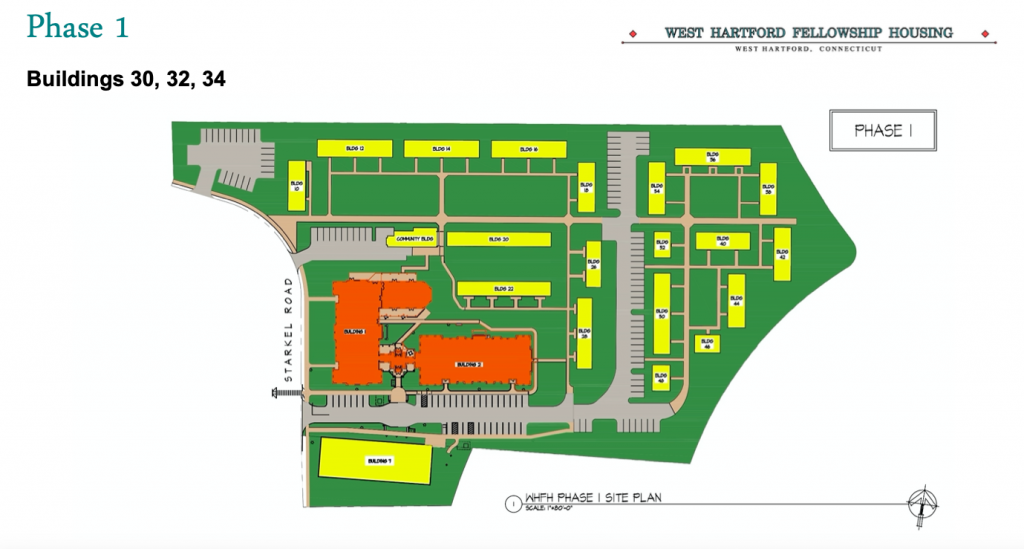
Phase 1 of the redevelopment of West Hartford Fellowship Housing will result in the demolition of 22 units in three buildings and the construction of 65 units in the new buildings shows in red. Courtesy image (we-ha.com file photo)
The four-phase project, with an estimated overall cost of $100 million, will involve replacement of 23 of the existing 24 buildings, and the size of the community will grow roughly 40%, from a current 213 units to 300. The first phase will add 43 additional units.
Overall, the new units will not only be 80-110% larger than the current apartments, but will also contain modern appliances and other amenities, and multi-story buildings will have elevators. The current layout is not conducive to accessibility, including the location of laundry facilities in a separate building. The apartments are small, have limited resources for connectivity, are not energy efficient, and there is no program space.
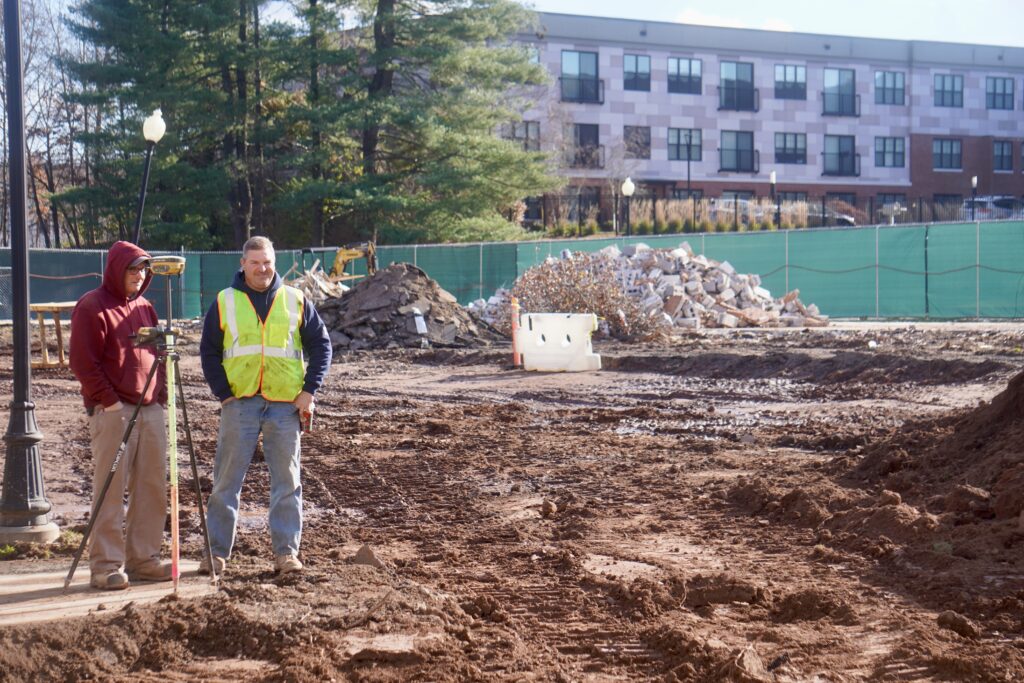
One of the West Hartford Fellowship Housing buildings has already been demolished, with the other two that are part of Phase I scheduled to come down ASAP. Photo credit: Ronni Newton

One of the West Hartford Fellowship Housing buildings has already been demolished, with the other two that are part of Phase I scheduled to come down ASAP. Photo credit: Ronni Newton
Hazardous materials abatement has already been completed and one of the buildings has already been demolished with the demolition of the second and third scheduled to begin right after the groundbreaking ceremony, Garilli told We-Ha.com on Tuesday.
While there were plans for possibly offsite relocation of some of the 21 residents who had been living in the buildings being demolished, Garilli said they were able to relocate all of them to other units within West Hartford Fellowship Housing “one unit at a time,” as vacancies arose.
Those individuals are protected under the Uniform Relocation Act (URA), he said, and will have “first right of refusal to move into the new units.”
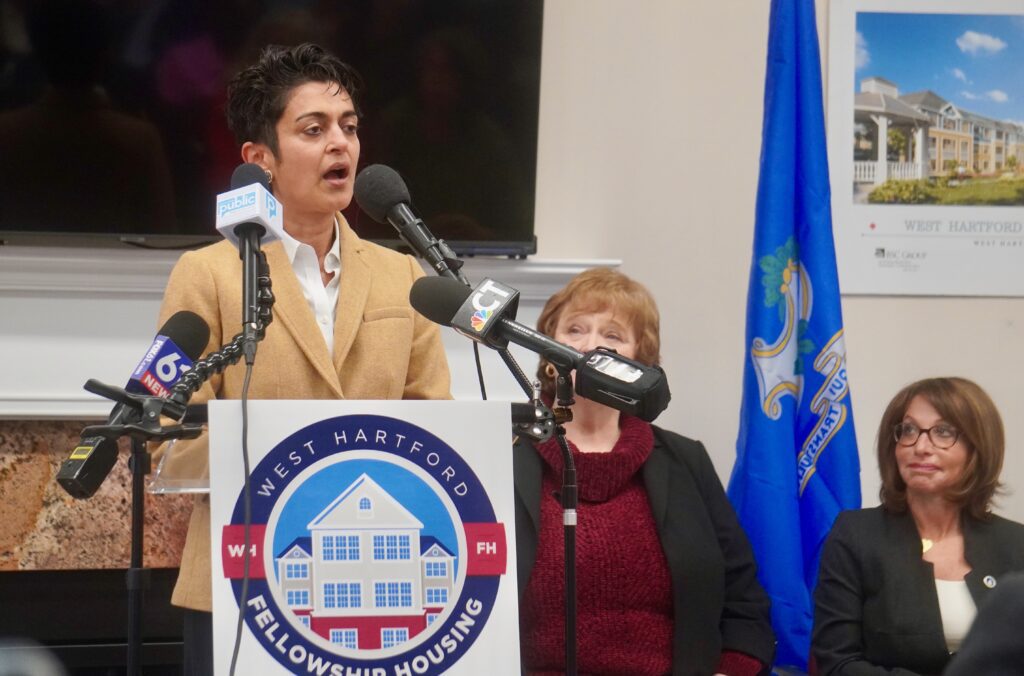
Connecticut Housing Finance Authority (CHFA) CEO and Executive Director Nandini Natarajan. Photo credit: Ronni Newton
Natarajan said this project was truly collaborative, and as a West Hartford resident herself she said she is really proud of the mayor, Town Council, and others who have been committed to ensuring the property remain affordable. This is one of the first “preservation” projects for CHFA, which has been involved with West Hartford Fellowship Housing since the 1970s, but as housing stock ages, the importance of providing financing for extending the useful life of properties to ensure seniors and the disabled have the housing and support they deserve, cannot be understated, she said.
“It’s going to replace outdated buildings, outdated structures, with modern, spacious units. The community will in fact expand by almost 40% over four phases of the redevelopment. And in short, it’s going to accommodate a growing need for affordable housing,” Natarajan said.
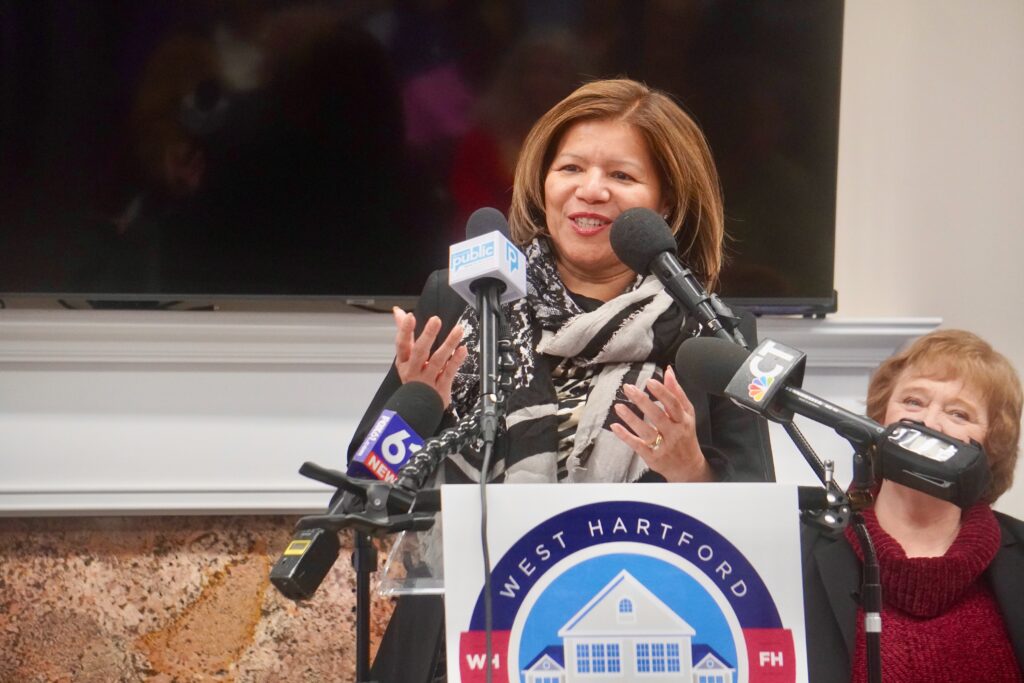
Connecticut Department of Housing Commissioner Seila Mosquera-Bruno. Photo credit: Ronni Newton
Mosquera-Bruno said for the Department of Housing, preservation is as important as new construction. “We understand that we can’t have families and individuals living in substandard conditions.”
This particular project is both about preservation and an expansion of the community – adding more units to reach a total of 300 affordable apartments. The Department of Housing is happy to have contributed $4 million in state bonds, she said, and $3.2 million in federal resources, and technical assistance.
West Hartford Fellowship Housing is also an example of great collaboration with the town, which owns the land, and she said she is excited to come back for a ribbon cutting in 18 months.
“This is the end of the process but the beginning of a new life,” Mosquera-Bruno said.
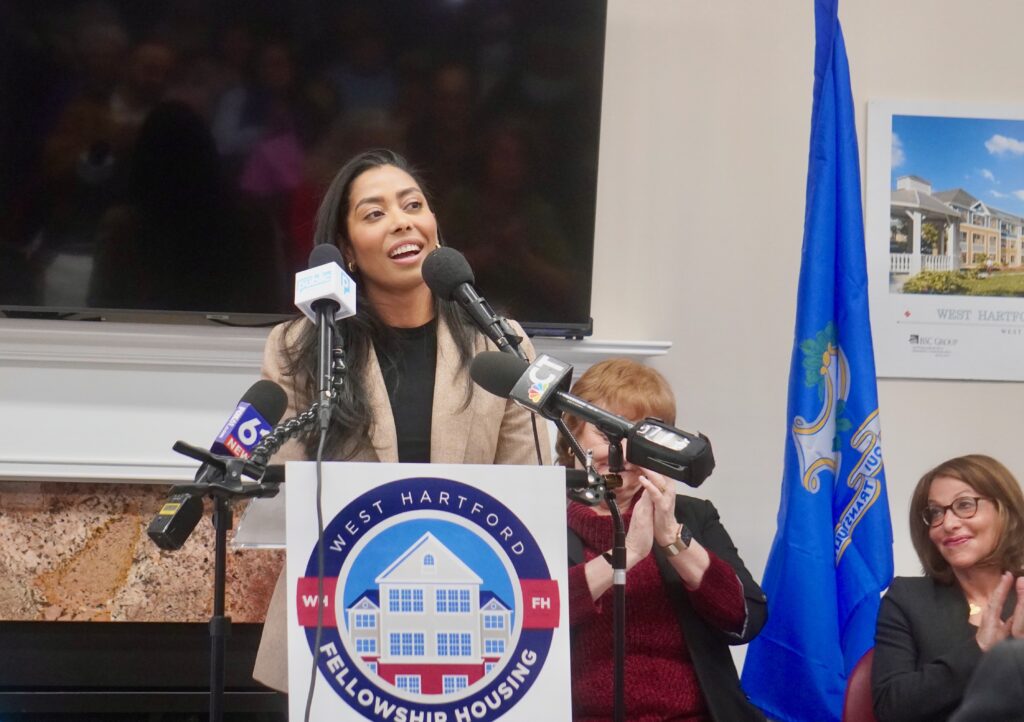
HUD New England Administrator Juana Matias. Photo credit: Ronni Newton
Matias congratulated the partnership between West Hartford and other organizations for their attention to housing a vulnerable population, and touted West Hartford for “certainly helping the Biden-Harris administration achieve its long-term national goal of increasing our nation’s supply of affordable homes through building, preservation, and innovation. As we all know, housing at its core is about people,” she said, and it’s foundational.
She noted that the town is close to reaching the threshold of having 10% affordable housing stock, West Hartford’s affordable housing plan is close to being finalized, and the town is using $6 million in ARPA funds to support eligible affordable housing projects.
Allowing seniors to age in place is critical, Matias said. HUD dollars have been leveraged with other funding sources for the project, she said, and HUD will also be paying the rent on 20 of the units “for decades to come.”
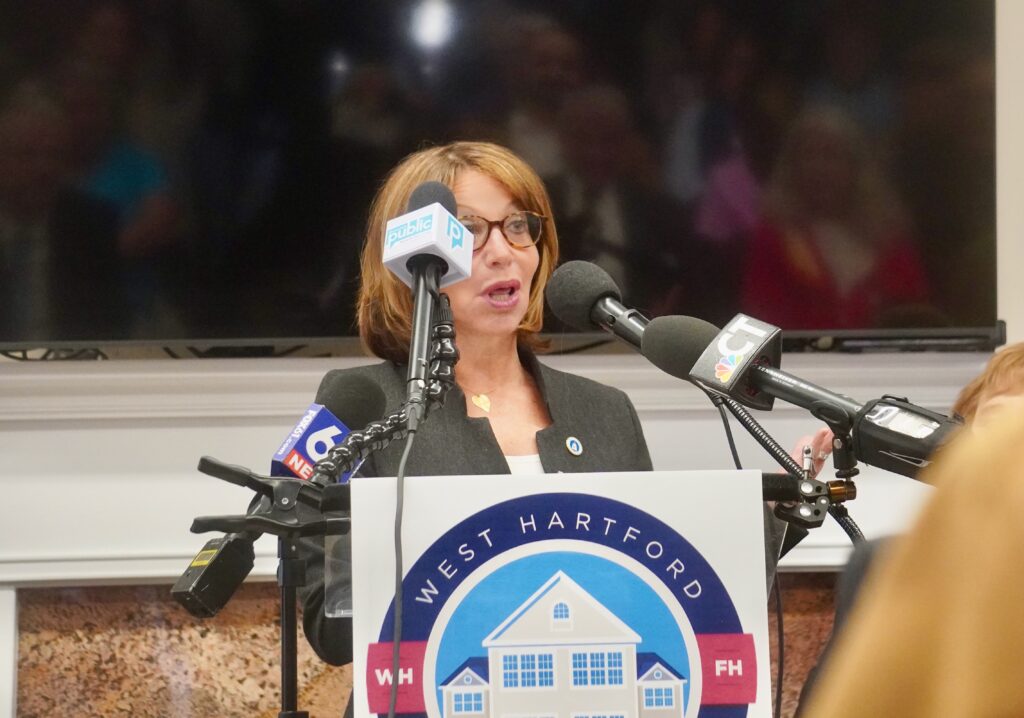
West Hartford Mayor Shari Cantor. Photo credit: Ronni Newton
Cantor, who has been a long-time supporter of West Hartford Fellowship Housing, noted the level of commitment it has taken to get to this point and the “culmination of the commitment of the town efforts to provide affordable housing, respect, and dignity for a treasured group of residents that have endured much in their lives.” Kindall also served on the Town Council, Cantor said, “and when she got an idea she didn’t let go of it,” including this redevelopment and expansion project.
She also recognized Town Clerk Leon Davidoff, a former Town Council member who was president of the Fellowship Housing Board, as well as Deputy Mayor Ben Wenograd, Town Council member and Fellowship Housing Board member Alberto Cortes, and Town Council member Deb Polun – all of whom were in attendance at the groundbreaking.
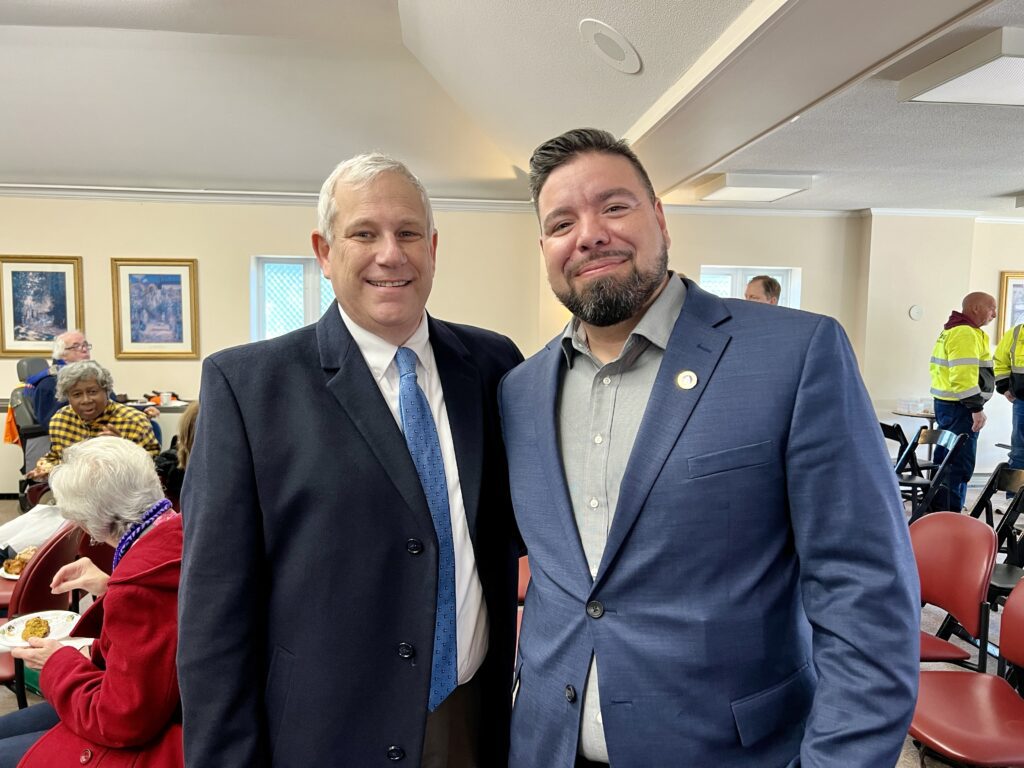
Town Clerk Leon Davidoff (left) and Town Council member and Fellowship Housing Board member Alberto Cortes. Photo credit: Ronni Newton
The town has been involved in West Hartford Fellowship Housing since the beginning, committing the valuable 9-acre parcel for “people to live in safety and dignity,” Cantor said.
“One of the reasons why we are so top-ranked is that we don’t stand still. We keep moving forward, and that means meeting one of the biggest crises we have in our country – providing housing to people at all income levels, quality housing,” she said. The project is also about sustainability – and making sure that older facilities are sustainable.
“We’ve been to a lot of groundbreakings, but this one’s particularly special. It has been a long time in the making – all the pieces that come together with affordable housing, it’s complicated,” Cantor said. “It takes a real commitment.”
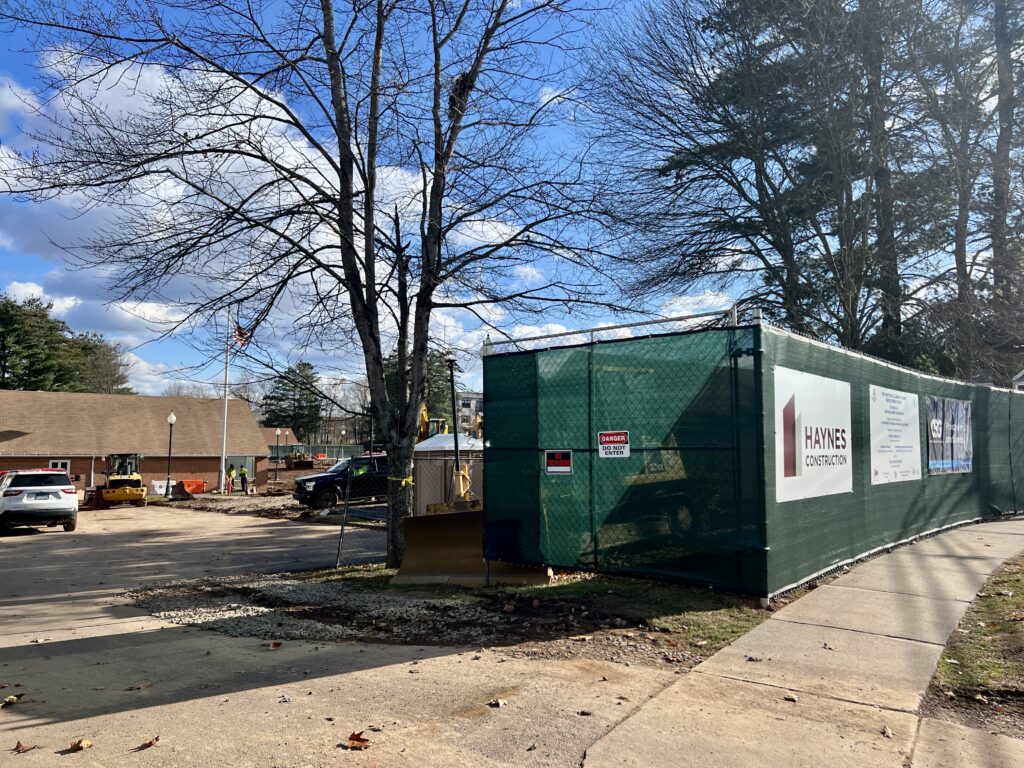
A redevelopment and expansion project is now underway at West Hartford Fellowship Housing. Photo credit: Ronni Newton
Many of the residents of West Hartford Fellowship Housing were concerned about being displaced, either temporarily or permanently, and there was for a while the possibility that the development would become market rate, Cantor said. “The recommitment of the town, the recommitment of the partners to make sure this place – that 50 years ago the Council had dedicated to affordable housing for seniors and people with disabilities – remains a high quality project.”
She thanked the governor and lieutenant governor for their support and leadership, and said she has complete confidence that disruptions for the residents over the next 18 months will be kept to a minimum.

Lt. Gov. Susan Bysiewicz. Photo credit: Ronni Newton
“To put $100 million together, of local, state, federal money, nonprofit resources, private resources – you do need a village but smart women definitely can do it,” Bysiewicz said, referencing the panel of speakers, who other than Garilli were all women.
“This is how we see the future. We also need more affordable housing,” Bysiewicz said, noting that she loves coming to West Hartford because the town’s leadership has encouraged all new developments to have an affordable component. “To have 87 new units as part of this beautiful project is just fantastic for Connecticut and it’s critical for Connecticut,” she said, because there are 100,000 open jobs and 100,000 more units of affordable housing needed in the state. This project will spur economic development, and is also convenient for walkability and access to transportation.
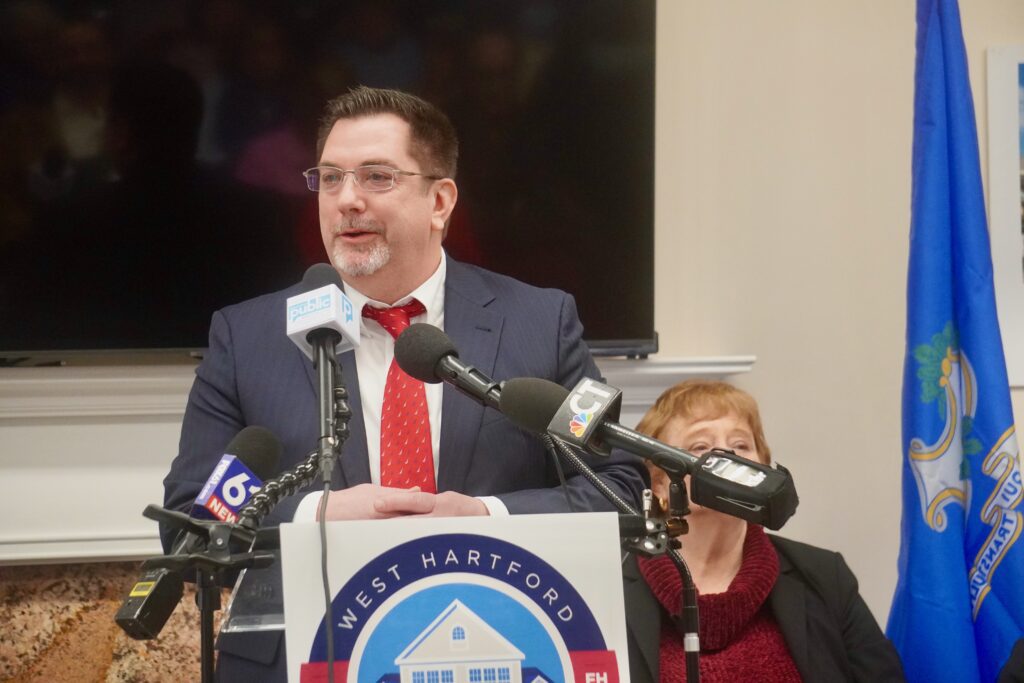
West Hartford Fellowship Housing Executive Director Mark Garilli. Photo credit: Ronni Newton
Garilli, on behalf of the residents, staff, professional team, and Board of Directors of West Hartford Fellowship Housing, recognized Kindall for her role in making this project a reality and her unwavering commitment.
Sixty percent of West Hartford Fellowship Housing residents – who are either over age 65 or have a disability – live on an income of less than $1,350 per month, and more than 20% of residents live on less than $800 per month. Thirty seven percent of the residents receive Social Security Insurance benefits and 36% receive food stamps. The property has maintained full occupancy, and has a significant waiting list.
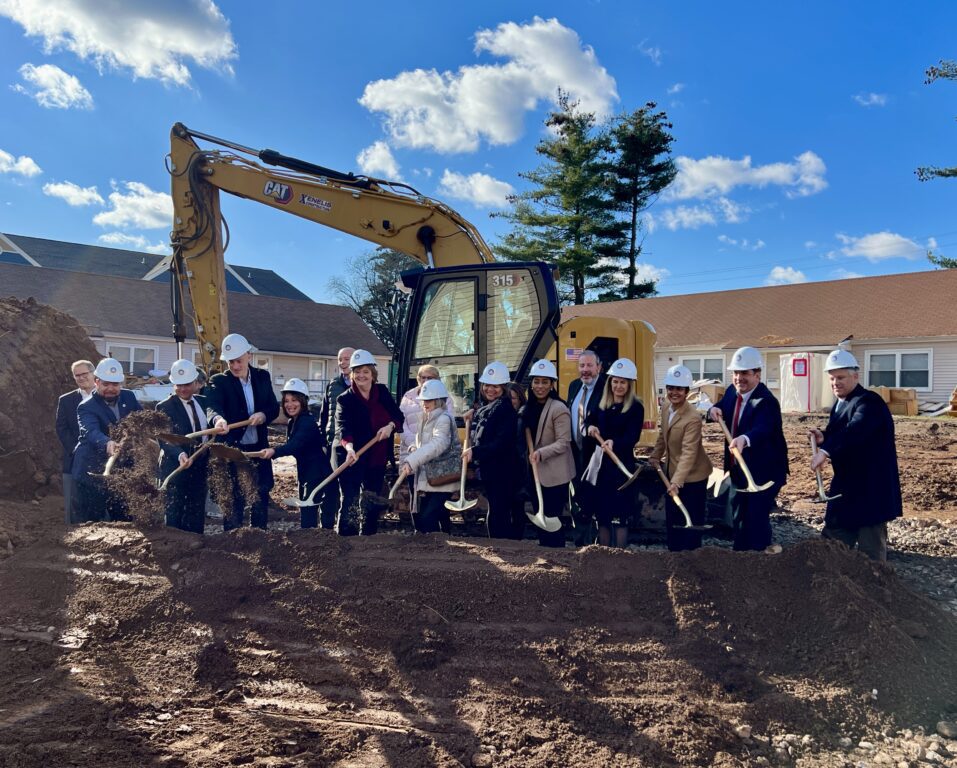
The groundbreaking for West Hartford Fellowship Housing was celebrated Tuesday by Lt. Gov. Susan Bysiewicz, Mayor Shari Cantor, CHFA CEO Nandini Natarajan, CT DOH Commissioner Seila Mosquera-Bruno, HUD Regional Administrator Juana Matias, and other officials and stakeholders. Photo credit: Ronni Newton
Like what you see here? Click here to subscribe to We-Ha’s newsletter so you’ll always be in the know about what’s happening in West Hartford! Click the blue button below to become a supporter of We-Ha.com and our efforts to continue producing quality journalism.

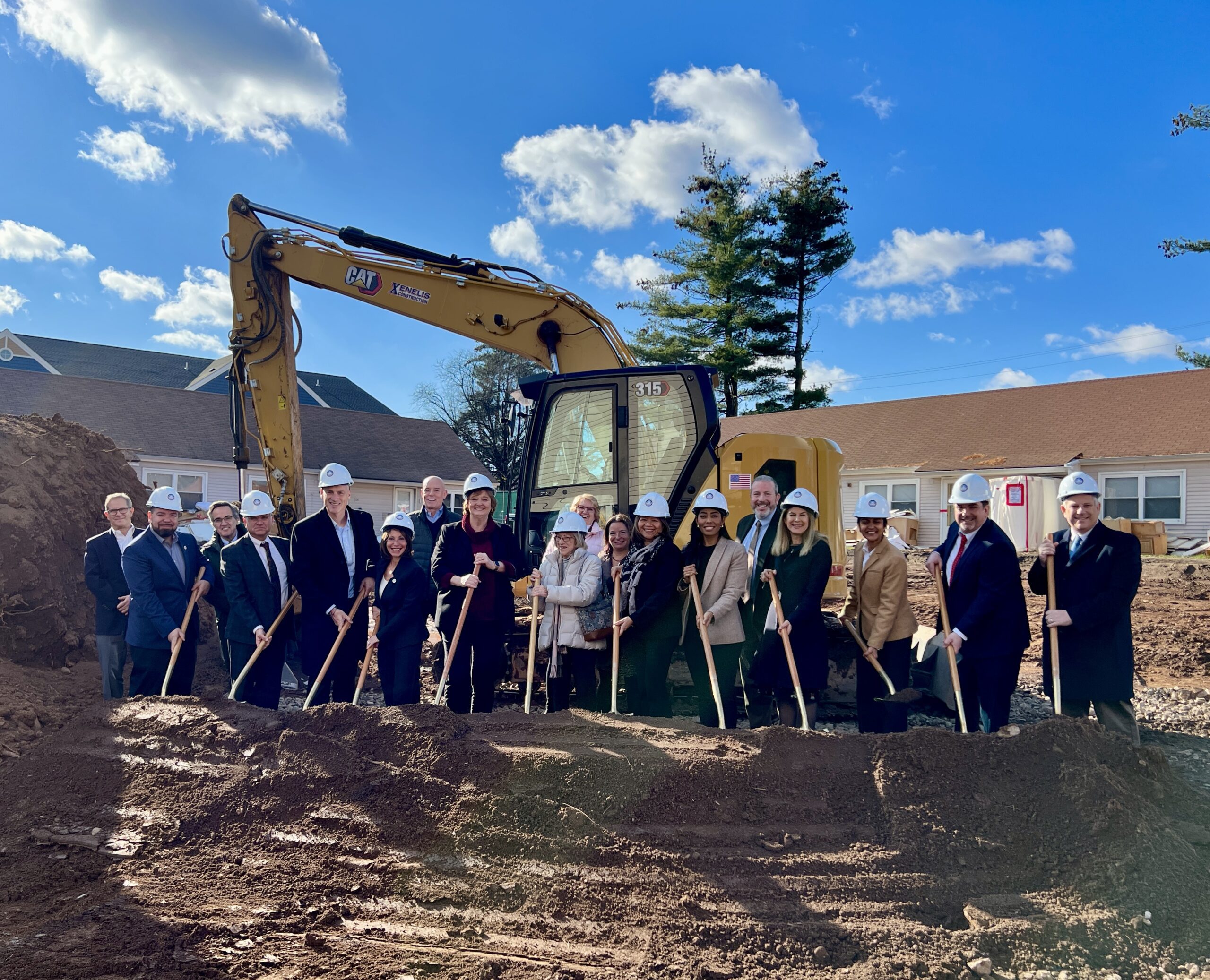


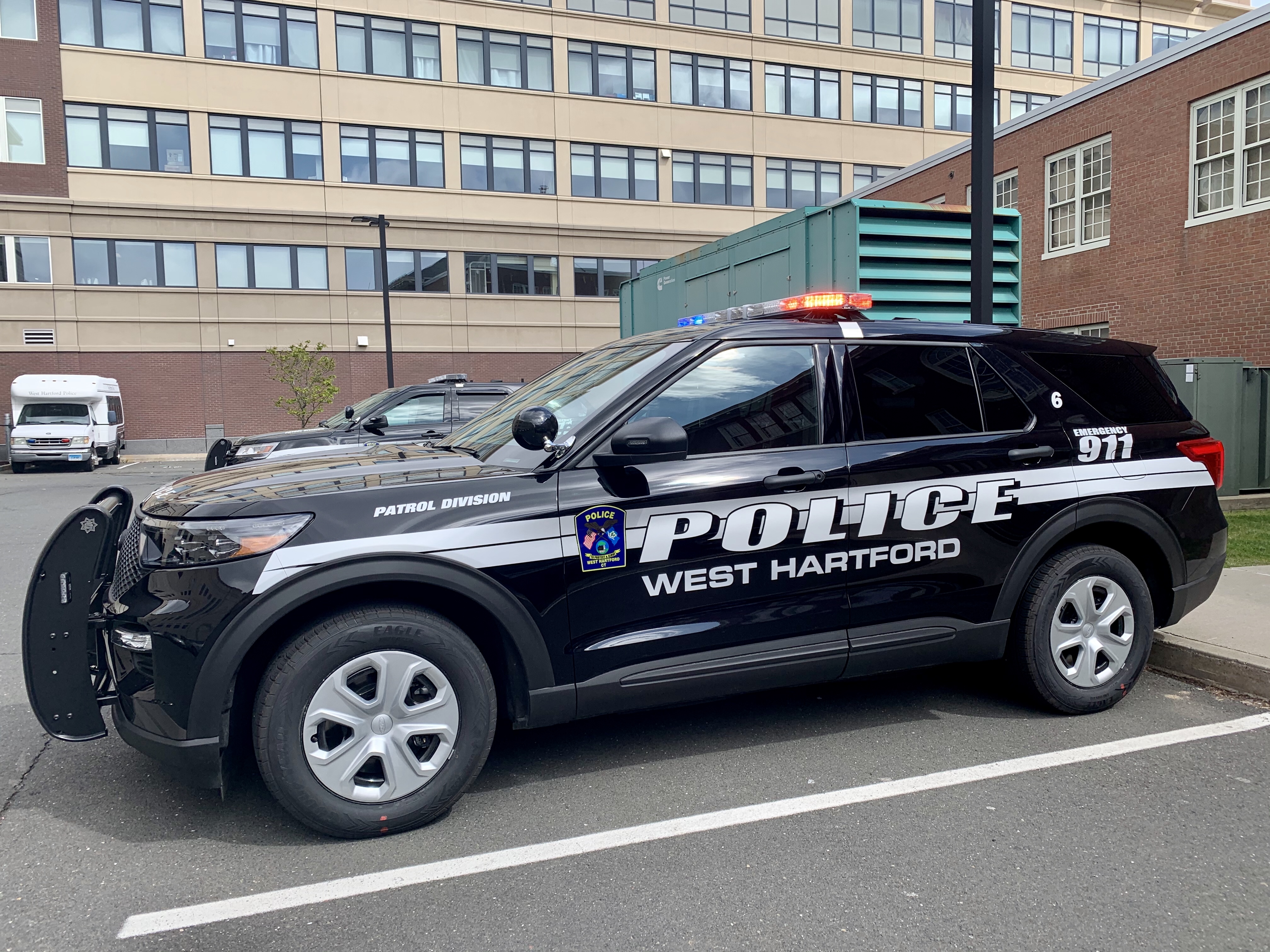
[…] West Hartford Fellowship Housing, which is 100% affordable housing for seniors and individuals with disabilities, and will be increasing the number of units from 213 to 308. […]